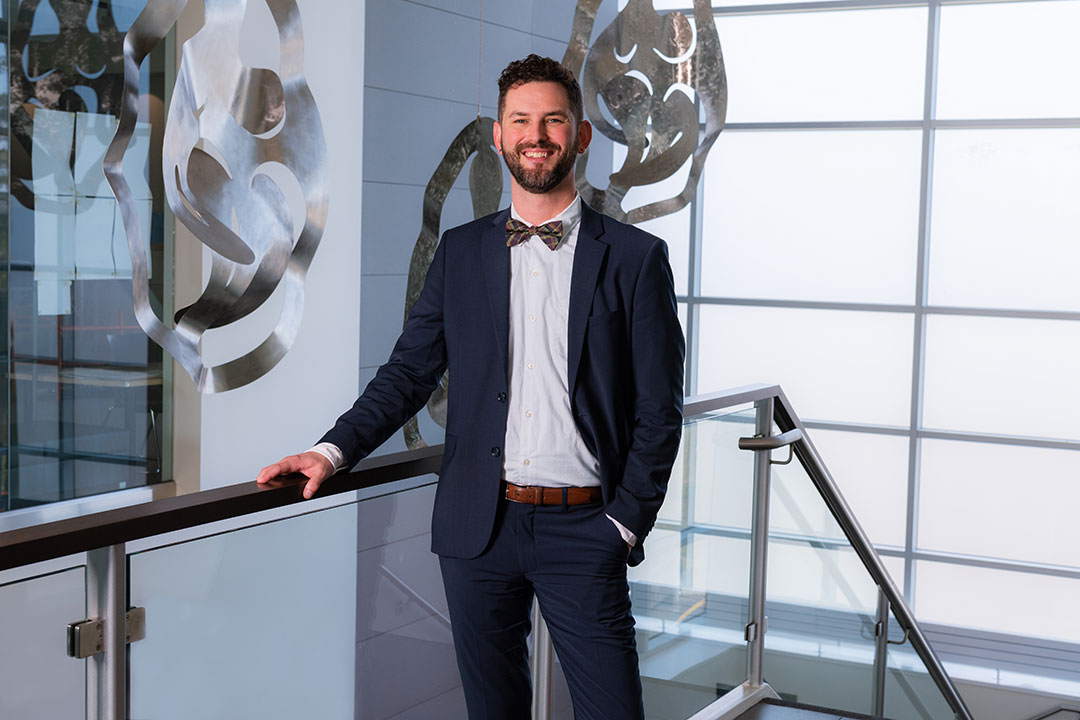Jason Listman raises the bar in student-centered education
Eisenhart award winner committed to creating compassionate ASL interpreters and independent thinkers
Matthew Sluka
Associate professor Jason Listman has been named one of this year’s recipients of RIT’s Eisenhart Awards for Outstanding Teaching.
From an early age, Jason Listman knew that he was called to serve and help people navigate through their challenges. But it was a connection with an RIT/NTID professor that steered him into the classroom, where he would soon stand out as an instructor, mentor, and facilitator.
Listman, associate professor in NTID’s Department of ASL and Interpreting Education, is one of this year’s winners of the Eisenhart Award for Outstanding Teaching, RIT’s highest honor for tenured faculty.
His philosophy involves presenting material in a way that encourages students to embrace their choice to study and excel in sign-language interpreting, empathize with those they come into contact with, and become independent thinkers and life-long learners. Listman has also adapted his teaching style to fully incorporate technology into the classroom, believing that technology has enhanced his instruction and has helped him consistently re-examine the curriculum and subscribe to what he calls “transformative learning” and critical thinking.
“When I first started as an instructor, I would simply stand up in the front of the class and lecture. I would present the material and expect the students to ingest it as it was given to them,” he said. “Now, after years of reflecting, self-improvement, and experience, I have realized that if I’m talking for more than an hour, something’s wrong. There are times when I need to just be quiet, let them learn, and monitor how they use ASL as they’re learning.”
Listman, who earned a bachelor’s degree in psychology and a Master of Science in secondary education, both from RIT/NTID, says his favorite part of teaching is seeing his students excited and ready to learn.
“Students would come up to me after class and say how much they enjoyed the lesson today and how much it changed their way of framing things, making them more independent thinkers. My role is not just to teach a language, but to help students to take a step back and think for themselves. To look at the whole picture and at other perspectives. I want to foster meta-linguistics awareness, which is what helps to create great interpreters.”
As for that connection with his former professor, Listman credits much of his inspiration to his interactions with Peter Hauser, director of NTID’s Research Center on Culture and Language. As a student, Listman says it was vital to look up to someone who was what he hoped to be someday—a great teacher and researcher.
“Jason is an incredibly innovative professor who naturally connects with each student and provides them with the support, knowledge, and skills each individual student specifically needs to succeed in their chosen career path,” said Hauser. “He is among the top 1 percent of professors leading and expanding the international discipline studying how to teach signed languages to adult learners. He knows that his field needs more scholars, so he makes opportunities for his students who show interest in research.”
Looking ahead, Listman says he will continue to be his authentic self in and out of the classroom. He will remain committed to his values, maintaining personal balance, and his work against racism. In addition to conducting his research his ASL education, he is also hoping to further facilitate connections between his students and the Deaf community, particularly in the aftermath of COVID-19.
“Today’s generation is enmeshed with technology when it comes to communication. We need to get back to being comfortable with face-to-face communication, which is an essential skill for ASL interpreters. We need much more community engagement and out-of-the-box thinking.
“As for me, I want to use my leadership background to train future educators and continue innovation within our department. And I want to be that faculty member who inspires and encourages. The world is changing, and it’s up to us to raise the bar when it comes to teaching and remaining student centered.”










